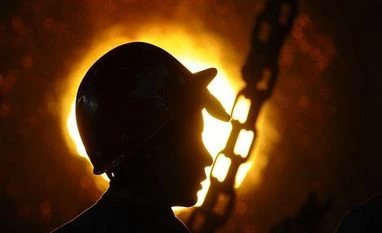To an outsider, Marhowra in Bihar looks like a graveyard, full of the tombs of long deceased factories. The names engraved on them — Morton Confectionary, Saran Distillery, Saran Engineering Works and Kanpur Sugar Works — speak of an earlier period of glory when this place used to be the industrial jewel of Bihar.
These factories were shut down over a decade ago. Even the most optimistic soul among the locals could not dream of a revival of the 1970s and ‘80s when the town hummed with the sound of production.
In June 2016, therefore, local excitement was at fever pitch when the ground breaking ceremony took place of GE Transportation’s new plant that would make diesel freight locomotives for the Indian Railways under the Make in India programme. It seemed like the beginning of a new era. Some remember the exact day, September 17, 2018, when the factory opened for business.
The words of Bindu Devi, who runs a one-room beauty parlour here, sum up the feelings of the local community. “The whole town revolves on the axis of the GE factory. All our businesses are based out of it. During the construction phase and even now, a lot of people got jobs. I get the majority of my clients from the adjacent GE township,” said Devi.
The sense of progress is palpable. “Around our village, there is visible development that has happened. You can see that in some of the thatched roofs that are now well-built houses,” said Dharmendra Rai, headmaster at Talpuraina School.
Based on the 2011 population census, women’ literacy rate in Marhowra was low at 52.8 per cent, as compared with the national average of 65 per cent. GE Transportation took up the challenge of empowering women. As part of its corporate social responsibility project, it taught vocational skills to local girls.
Women work on the shop floor and 25 per cent of the specialised jobs such as welding are done by them. “I look into quality parameters for Human Resources. I have to improve Kaizan (a Japanese method to continuously improve all functions at the workplace). We reward people on the basis of points,” said Akansha Kumari from Jharkhand who is in charge of HR.
Life at GE Transportation starts at 7 am every day with a meeting of level one employees who try to identify and address possible issues. “They try to solve it and if they cannot, then the issue may come up to the next level, the ‘coaches’. If the coaches are not able to solve the problem, it comes to the ‘mentors’,” explained M. Annamalai, senior operations manager.
For Pappu Kumar, son of a farmer from Gaya, getting a job at GE Transportation after finishing his course at a Patna polytechnic, was like getting a job with a multi-national next door. “Initially, we had training at Pune. After that, we had class room training and then practical welding training in Patna. My parents wanted me to go for a BTech after my diploma but now they are very happy at the way my life has changed,” said Kumar.
If the making of a locomotive is complex, testing it is even more so. This ranges from checking the strength of all the wires, the installed programmes, communication systems, lighting, cables and the integrated brake system.
“A communication system has been set up here. All the GPS systems are available in these locos. This is part of our static or commercial tests. We test all the functionalities here. Then we take it for painting and a service test which includes diesel, oil, coolant and sand (to make friction effective during the rainy seasons),” said Veera Kumar, quality leader.
The company’s role does not end once the locomotive has rolled out of its doors. It has a Remote Monitoring and Diagnostics facility at Roza for predictive maintenance which constantly monitors the locomotives whenever they are in service. In addition, it has formed rapid response teams in various parts of the Northern Railways who can provide fast technical intervention.
Training of the loco pilots is also important because everything about the locomotive, including the aircraft-like panel of flashing lights and buttons, is high-tech. By the end of its contract with the Railways, GE Transportation will have trained around 16,000 loco pilots.
Life in Marhowra is looking up. The roads and lighting are better. There is a vocational training centre. The earlier dingy shed of a primary health care system with half a shelf of medicines is being replaced by a new modern centre to cater to not just the factory employees but to the nearby villages. To connect the town with Patna, 80 km away, for its employees, GE Transportation runs a special bus service. Bit by bit, it looks as though Patna is spreading towards Marhowra.
Unlock 30+ premium stories daily hand-picked by our editors, across devices on browser and app.
Pick your 5 favourite companies, get a daily email with all news updates on them.
Full access to our intuitive epaper - clip, save, share articles from any device; newspaper archives from 2006.
Preferential invites to Business Standard events.
Curated newsletters on markets, personal finance, policy & politics, start-ups, technology, and more.
)